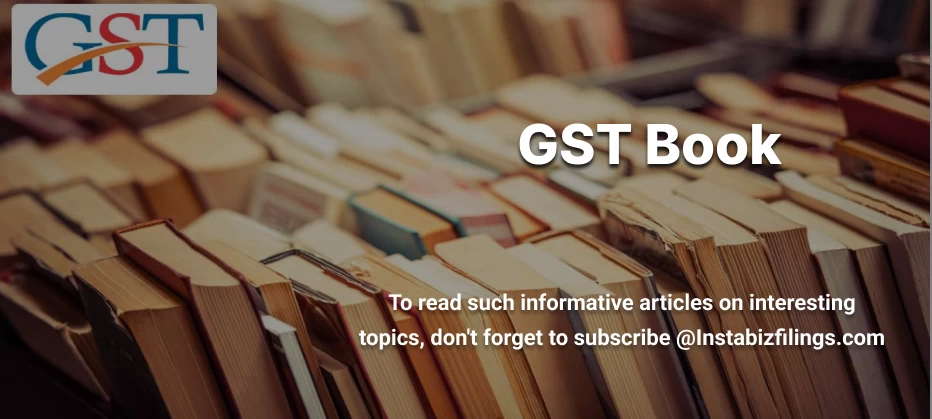
GST Book
August 2, 2024 by Team Instabizfilings
Essential GST Books for Businesses
Under the GST Tax businesses are mandated to maintain specific books to ensure accurate tax calculations and timely filings. Here are the essential GST Registration Process GST books that every business must maintain:
-
GST Tax Invoice Book: A New Tax Regime invoice is a document detailing the goods or services provided by the business. This book serves as a record of all tax invoices issued.
-
GST Purchase Invoice Book: A GST purchase invoice details the goods or services acquired by the business. This book maintains a record of all purchase invoices received.
-
GST Credit Note Book: Issued when there is a reduction in the value of supplied goods or services, the credit notebook records all credit notes issued by the business.
-
GST Debit Note Book: In cases where there is an increase in the value of supplied goods or services, the debit note book logs all debit notes issued.
-
GST Payment Voucher Book: This book logs all payments made by the business for goods or services supplied, keeping a detailed record of all payment vouchers issued.
-
GST Receipt Voucher Book: This book documents all receipts collected by the business for goods or services supplied, keeping a record of all receipt vouchers issued.
-
GST Refund Voucher Book: This book tracks all refunds received by the business for excess tax paid or other reasons, maintaining a record of all refund vouchers issued.
Importance of Maintaining GST Books
Maintaining these GST books is crucial for several reasons:
-
Compliance: Ensures adherence to GST regulations, avoiding potential penalties and legal issues.
-
Accuracy: Facilitates precise calculation of GST liabilities and input tax credits, minimizing errors.
-
Efficiency: Streamlines the GST filing process, saving time and resources.
-
Financial Insights: Offers crucial financial information, supporting improved planning and decision-making.
By keeping these essential GST books, businesses can navigate the GST landscape with confidence and unlock their path to success.
Additional GST Books for Enhanced Compliance
In addition to the basic GST books, businesses may opt to maintain several other records to streamline their GST compliance and operational efficiency:
-
Input Tax Credit (ITC) Register: This register records all input tax credits claimed by the business. It aids in reconciling the claimed ITC with the ITC available in the electronic credit ledger, thereby ensuring accuracy and compliance.
-
Output Tax Liability Register: This register tracks the t Save Income Tax in India liability for goods or services supplied by the business. It aids in determining the exact amount of tax to be paid during return filings, simplifying the tax payment process.
-
E-Way Bill Register: E-Way bills are mandatory for the movement of goods valued above Rs. 50,000. This register maintains a record of all E-Way bills generated by the business, facilitating smooth logistics and compliance.
-
Stock Register: This register records the opening stock, purchases, sales, and closing stock of goods. It helps in reconciling the physical stock with the stock recorded in the books of accounts, ensuring inventory accuracy.
-
Job Work Register: This register logs details of goods sent for job work and goods received after job work. It aids in reconciling inputs sent for job work with inputs received, ensuring proper tracking and compliance.
Benefits of Maintaining Additional GST Books
Maintaining these additional GST books offers several benefits:
-
Enhanced Compliance: Ensures adherence to GST regulations, reducing the risk of penalties and legal issues.
-
Improved Accuracy: Facilitates precise calculation of GST liabilities and input tax credits, minimizing errors.
-
Operational Efficiency: Streamlines GST return filing processes and optimizes inventory management, resulting in significant time and resource savings.
-
Financial Insights: Provides valuable financial data, supporting better planning and decision-making.
Conclusion
In summary, maintaining accurate books of accounts is crucial for businesses to adhere to GST registration regulations. The essential GST books outlined above constitute the minimum requirements for managing GST compliance. However, keeping additional records can offer a more detailed insight into the business's GST compliance status. It is recommended to consult with a professional accountant to ensure full compliance with GST laws.
Disclaimer
The information provided in this blog is purely for general informational purposes only. While every effort has been made to ensure the accuracy, reliability and completeness of the content presented, we make no representations or warranties of any kind, express or implied, for the same.
We expressly disclaim any and all liability for any loss, damage or injury arising from or in connection with the use of or reliance on this information. This includes, but is not limited to, any direct, indirect, incidental, consequential or punitive damage.
Further, we reserve the right to make changes to the content at any time without prior notice. For specific advice tailored to your situation, we request you to get in touch with us.

Need more details? We can help! Talk to our experts now!
Start Your Business Registration – Talk to Our Experts Now!

Still Confused?
Talk to experts? Fill in the information and we will reach out in 24 Working Hours.

